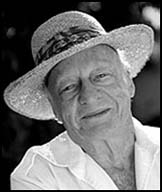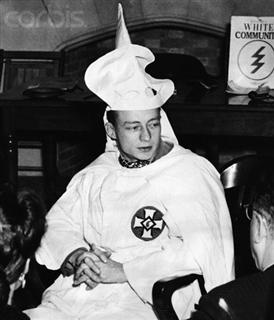STETSON KENNEDY
Folklorist, Author, & Civil Rights Crusader
By Mike Miller Updated June 22, 2025
 Stetson Kennedy
Stetson KennedyAt the time of his death Stetson Kennedy was one of the oldest living Florida authors.
He was born on October 5, 1916 in Jacksonville, Florida, and died on August 27, 2011. Kennedy was distantly related to the famous hat maker, John B. Stetson.
Kennedy spent his life chronicling the voices of everyday Floridians while fighting racism and injustice across the South.
A prolific writer and social activist, Kennedy gained national attention for his undercover infiltration of the Ku Klux Klan, his leadership in the Florida Writers’ Project, and his pioneering work preserving the oral traditions of Florida Black and Florida Cracker communities.
Early Life and Education
Raised in the well-to-do Jacksonville neighborhood of Avondale, Kennedy came from a family deeply rooted in the South. His father owned a furniture store downtown, and his maternal grandfather had operated a general store in Punta Gorda.
 Kennedy House at 3664 Hedrick Street
Kennedy House at 3664 Hedrick StreetAvondale Neighborhood, Jacksonville, Florida
Like many Florida families of their time, their heritage included connections to the Confederacy and the Ku Klux Klan—facts that would later contrast sharply with Kennedy’s personal mission.
While working as a teenager collecting furniture payments, Kennedy encountered the harsh realities of poverty and racial inequality.
Those experiences, combined with stories heard along the Jacksonville docks and in rural schools, became the seeds of his folkloric and activist career.
At Robert E. Lee High School in Jacksonville, Kennedy's first act of social reform was convincing friends to join a fraternity that allowed Jewish members, bucking the trend of exclusionary clubs in the South of the day.
He briefly attended the University of Florida but soon left in 1937 to pursue journalism and activism.
Florida Writers’ Project and Folklore Work
Kennedy’s breakthrough came when he joined the Florida Writers’ Project under the Works Progress Administration (WPA) in the late 1930s.
There, he contributed to Florida: A Guide to the Southernmost State and edited oral histories of elderly former slaves, many of which were later published in his book, The Florida Slave.
In his early twenties, Kennedy became head of the project's folklore division, working alongside Zora Neale Hurston to document Black and rural Southern traditions.
Carrying a bulky audio recorder, Kennedy ventured through swamps, turpentine camps, and cow pastures to capture stories, songs, and dialects—recordings that now form part of the American Folklife Center at the Library of Congress.
Fighting Jim Crow and the Ku Klux Klan
Exempt from military service due to a back injury, Kennedy took a position with the Congress of Industrial Organizations (CIO) in Atlanta, where he directed efforts against the South’s racist voting system.
His journalism exposed the mechanisms of Jim Crow laws, poll taxes, and white primaries. His work became widely published, including in PM, The Nation, and The New Republic.
Perhaps Kennedy’s most daring work was infiltrating the Ku Klux Klan under the alias John Perkins.
He passed internal documents to the Anti-Defamation League, the Georgia Bureau of Investigation, and Washington Post columnist Drew Pearson.
His work contributed to the IRS seizing back taxes from the Klan and the revocation of its national corporate charter by the State of Georgia.
Kennedy also collaborated with the producers of the “Superman” radio show, providing secret Klan rituals and code words for a 16-part series called “Clan of the Fiery Cross,” which helped publicly ridicule and demystify the group.
 Stetson Kennedy
Stetson KennedyStetson Kennedy infiltrated the Ku Klux Klan and other white supremacist groups.
While undercover in the Klan, he provided information about secret code words and details of Klan rituals to the writers of the Superman radio program.
This resulted in a series of episodes in which Superman battled the KKK. The symbolism was powerful.
International Advocacy and Continued Activism
In 1951, Kennedy testified before a federal grand jury regarding the Klan’s involvement in the bombing death of civil rights leader Harry T. Moore and other racially motivated acts of terror in Florida.
He even ran for Governor of Florida in 1952.
A few years later, he flew to Geneva to testify before a United Nations commission on American racism, despite having little money and no return ticket.
Although U.S. publishers hesitated to touch his increasingly provocative work, Kennedy found an audience in postwar Europe.
French philosopher Jean-Paul Sartre published his writings in Les Temps Modernes, and British publishers later issued his Jim Crow Guide to the USA.
Returning to Florida in the 1960s, Kennedy served as assistant director of an anti-poverty program in Jacksonville under President Lyndon Johnson.
He continued writing and lecturing on civil rights, race relations, and Southern culture for the rest of his life.
His friend Woody Guthrie, the folk singer and writer, was Kennedy's house guest many times over the years.
His most famous novel may be "Palmetto Country", a wonderful book that deeply explores Florida folklore. It was edited by Erskine Caldwell.
Woody Guthrie said about Palmetto Country:
"It gives me a better trip and taste and look and feel for Florida than I got in the forty-seven states I've actually been in body and tramped in boot."
Stetson Kennedy Legacy
Stetson Kennedy died in 2011 at the age of 94 and is survived by his widow, Sandra Parks, an author and former St. Augustine council member.
He authored several books during his lifetime:
He was honored with the Florida Heritage Award, the NAACP Freedom Award, and the Florida Historical Society’s Dorothy Dodd Lifetime Achievement Award. In 2005, he was inducted into the Florida Artists Hall of Fame.
Kennedy’s legacy is preserved at Beluthahatchee Park in the Fruit Cove area of St. Johns County—his longtime home and a place he named "the place of peace."
His personal archives reside in institutions such as the New York Public Library’s Schomburg Center, the University of Florida, and Georgia State University’s Southern Labor Archives.
The Stetson Kennedy Foundation continues his mission to promote human rights, folklore preservation, and environmental stewardship.
Tim Gilmore has written a wonderful story about the Kennedy house in Jacksonville along with a lot of interesting information about Stetson's boyhood. See Kennedy House.

Florida is the fastest-growing state in the United States and also the fastest-changing. If you see anything in this article that has changed or is in error, please let me know.
Thousands of Florida fans subscribe to our free daily Ezine, Florida Heritage Travel and we have 130,000 followers on Facebook.
By Mike Miller, Copyright 2009-2026
Florida-Back-Roads-Travel.com
Florida Back Roads Travel is not affiliated with or endorsed by Backroads, a California-based tour operator which arranges and conducts travel programs throughout the world.
